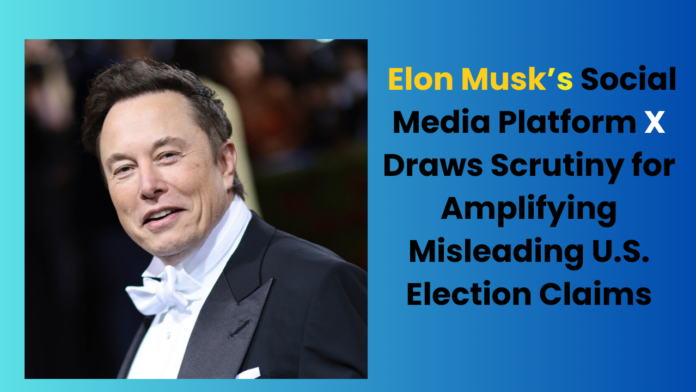In a striking report released by the Center for Countering Digital Hate (CCDH), billionaire entrepreneur Elon Musk’s social media platform X, formerly known as Twitter, has been identified as a significant channel for disseminating false or misleading claims about the upcoming U.S. presidential election. According to the CCDH, these claims have amassed a staggering 2 billion views this year, raising alarms among election and misinformation experts.
The report underscores the platform’s critical role in shaping public perception around key battleground states, which are poised to influence the election’s outcome. Experts warn that the unchecked spread of misinformation on platforms like X could undermine public confidence in the electoral process and fuel divisions among voters.
The Role of Platform X in Amplifying Election Misinformation
Since Musk’s acquisition of X in 2022, the platform has faced criticism for its relaxed content moderation policies and significant changes to its verification system. The removal of legacy blue checkmarks and the implementation of paid verification have arguably led to an increase in misleading content being shared by accounts that appear credible to users. The CCDH’s findings highlight that the platform’s algorithm may be contributing to the rapid dissemination of such content by promoting engagement without adequate content checks.
The report details that narratives ranging from false claims of voter fraud to misleading information about voting procedures are circulating widely, particularly in states that are considered electoral battlegrounds. These falsehoods often appear under hashtags and in trending topics, drawing millions of interactions and contributing to a cycle of amplification.
Experts Raise Concerns
Election experts and digital watchdogs have expressed grave concerns about the implications of such widespread misinformation. “When platforms with significant reach like X fail to regulate misleading content effectively, the ramifications extend far beyond online discourse — they threaten the integrity of democratic processes,” said an analyst from the Election Integrity Center.
Musk, who has publicly championed a free-speech ethos since taking the reins of X, has defended the platform’s policies, stating that they promote open dialogue and transparency. However, critics argue that this stance has allowed harmful content to flourish, presenting a challenge to election officials and fact-checkers alike as they attempt to ensure accurate information reaches voters.
Impact on the 2024 Presidential Race
With the 2024 presidential election shaping up to be one of the most contested in recent history, the spread of false information could have profound consequences. Swing states such as Pennsylvania, Georgia, and Arizona are already seeing a surge in politically charged, misleading posts that may influence voter behavior and erode trust in electoral systems.
“This is not just a digital issue; it’s a democratic issue,” emphasized a spokesperson from the Center for Countering Digital Hate. “Unchecked falsehoods have the potential to distort the outcome of elections, especially when they reach billions of views.”
Responses and Calls for Action
In response to the CCDH report, various advocacy groups and election watchdogs are calling on X to strengthen its content moderation policies and work proactively with independent fact-checkers to address false claims. Some are also urging lawmakers to revisit discussions on regulations aimed at holding platforms accountable for content that spreads misinformation.
For now, the challenge remains substantial. As election season heats up, the role of platforms like X in influencing public opinion becomes even more critical, leaving the broader question of how to balance freedom of speech with responsible oversight at the forefront of public debate.




